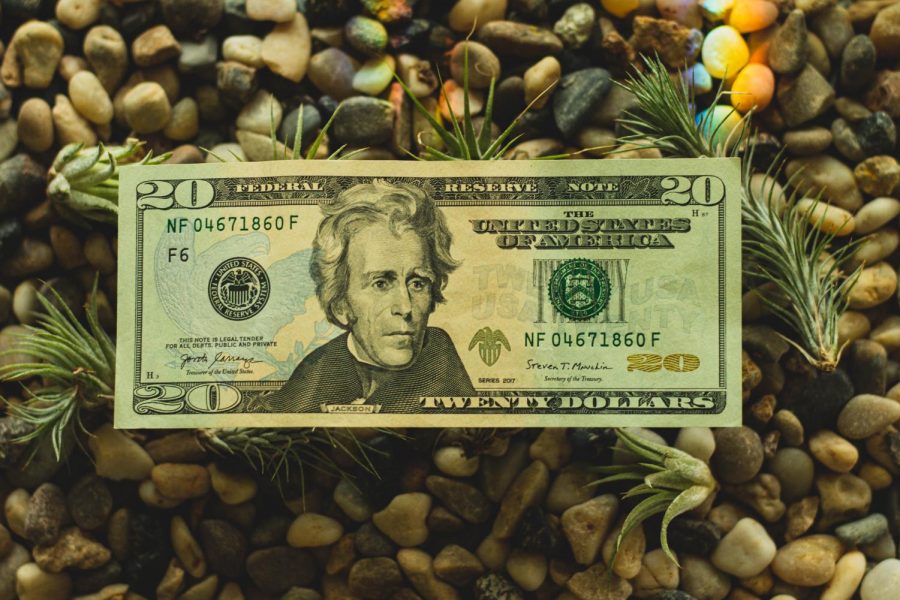Money Talks: Why We Need to Revamp Our Nation’s Currency
Money is inescapable, and because of that fact, we are in constant contact with the likeness of people whose ideas and actions are not fitting with those of the present.
March 10, 2021
Money. It’s a divisive yet inescapable evil. It’s a staple of any society.
America’s paper currency reflects this by commemorating some of our nation’s most prominent and admired figures — white males, some of whom were slave owners, racist, ethnocentric, or seen as bigots. None more so than the seventh president of the United States, Andrew Jackson.
On Jan. 25, White House Press Secretary Jen Psaki announced in a briefing that the Biden administration would resume efforts to put Harriet Tubman on the $20 bill. News of the $20 bill’s redesign was initially announced in 2016 under the Obama administration by former Secretor of the Treasury Jacob Lew, but was then shelved following Trump’s ascension to the presidency. Psaki emphasized the importance of commemorating our nation’s more obscured figures in one of the most transparent and prevalent mediums known as currency.
Tubman’s presence on the $20 bill will make her the first woman and person of color to be depicted on a U.S. banknote, a step towards celebrating the many eclipsed narratives of injustice, endurance, persistence, and progress in American history.
Escaping slavery to the north, returning to the south several times to help other slaves escape, and serving during the Civil War as a cook, nurse, and spy, Tubman deserves this recognition as an example of defiance and bravery.
Although it is not likely that we will see a Tubman twenty in circulation in the near future, it is important that Americans reconsider and examine symbols and figures who represent our country’s history.
Facets of American history have been overlooked. While I believe all history deserves to be remembered, all history does not rightfully deserve to be celebrated.
All U.S. banknotes, such as coins and some postage stamps, depict some renowned figure in American history or culture. While Jackson remains one of the most notable American presidents, his legacy and depiction on the $20 bill has been proved controversial in recent years as his actions during and after his presidency became more apparent.
During his presidency, the Indian Removal Act of 1830 was passed to make room for settlers, causing the forced migration of the peoples of the Cherokee, Creek, Choctaw, Chickasaw and Seminole nations in the infamous Trail of Tears. Jackson staunchly supported and participated in slavery, contradicting the idea of Jackson being a “man of the people.” When Jackson was elected president in 1827, he brought a large number of slaves to the White House. Therefore it seems fitting that a slave owner be replaced by former slave person and abolitionist, Harriet Tubman.
The $20 bill’s redesign is possibly one of a series of new proposed note designs that display the 1963 March on Washington and figures such as Sojourner Truth, Eleanor Roosevelt, and Susan B. Anthony.
This issue is not simply an inquisition or an erasure manifested in forgetting our nation’s past pride, but rather a departure and evolution from the idolatry of figures who the people have outgrown.
Money is inescapable, and because of that fact, we are in constant contact with the likeness of people whose ideas and actions are not fitting with those of the present.
The people represented on our bills certainly have done admirable things, but in addition to those are horrible and atrocious things that are overshadowed by the glorification they receive by being honored on our bills. It is a possibility to simply have our currency be void of any people to avoid conflict, but this would be a failure to utilize the capability that bills have to present a nation’s history and honor its notable figures.
We must introduce and celebrate notable people in our nation’s history who have been marginalized or excluded from commemoration. Broadening the representation on our nation’s currency will do just that. There is a noticeable lack of diversity on our bills, and I think this is a growing concern over recognizing the evils of the past and persistence today.
While the presence of some of our nation’s most revered figures may be missed, it is important that we bring light to the people whose ideas and actions are more relevant today. All history deserves to be remembered and stories like Harriet Tubman’s deserve to be celebrated.
Tubman’s placement on the $20 bill will bring a new perspective of American history in contrast to the dominant narrative of history — a legacy of conquest, domination, and falsehoods of superiority. By failing to celebrate the overshadowed stories of the past, we fail to understand more about the origins of race–related issues today. The dominant and continued representation of people who were morally misguided continues to undermine the pain racism has caused historically and instead augments reality to glorify a more convenient truth.






Ms. Spanjer • Mar 11, 2021 at 1:32 pm
It’s wonderful to see students thinking about these things. Well said John. I particularly enjoyed this quote from you: “While I believe all history deserves to be remembered, all history does not rightfully deserve to be celebrated.”